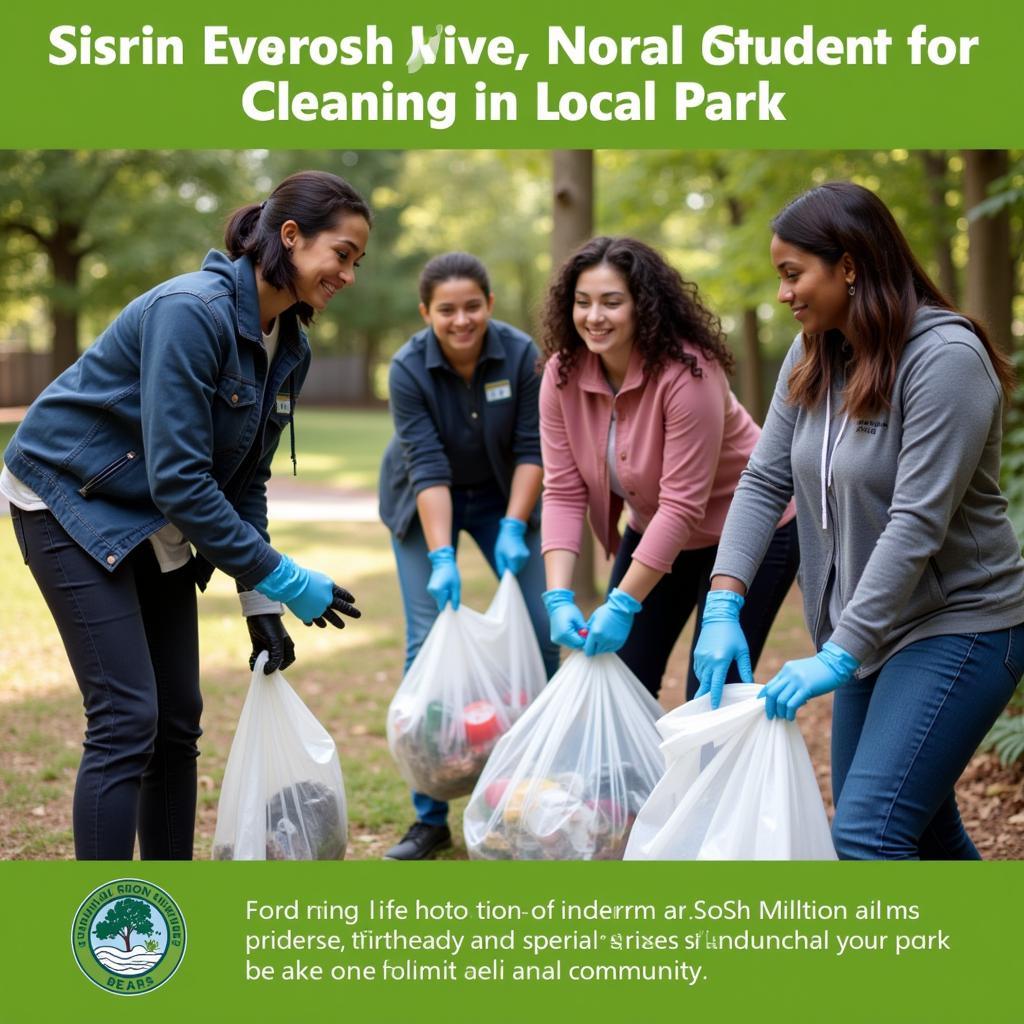National Honor Society Community Service Requirements are a cornerstone of membership. They emphasize the importance of giving back and fostering positive change. Understanding these requirements is crucial for aspiring and current members. This guide provides a detailed overview of everything you need to know about fulfilling your NHS community service obligations.
Understanding the Importance of NHS Community Service
Community service is more than just a requirement for the National Honor Society; it’s a core value. It’s about making a tangible difference in the lives of others and contributing to a better society. Through service, members develop leadership skills, empathy, and a deeper understanding of their community’s needs. These experiences often inspire a lifelong commitment to civic engagement. By participating in service initiatives, NHS members embody the organization’s pillars of scholarship, leadership, service, and character. You can even find opportunities that align with your interests, allowing you to explore potential career paths while giving back. For example, if you are interested in a medical career, volunteering at a local hospital could be a rewarding experience. Similarly, if you are passionate about environmental issues, participating in cleanup drives can be a great way to contribute.
Want to learn more about scholarship opportunities? Check out our guide on National Honor Society Scholarships.
Meeting National Honor Society Community Service Requirements
Each chapter of the National Honor Society may have slightly different community service requirements. It’s essential to consult your local chapter’s bylaws for specific guidelines. However, some common elements include a minimum number of service hours, a focus on unpaid service, and an emphasis on leadership and initiative. Typically, students are expected to complete a certain number of service hours each semester or academic year. The types of activities that qualify as community service can also vary. While direct service, such as tutoring or volunteering at a soup kitchen, is often preferred, indirect service activities, like fundraising or organizing awareness campaigns, may also be acceptable.
What Counts as Community Service for NHS?
Understanding what qualifies as legitimate community service is crucial for NHS members. Generally, activities that benefit the community without any form of payment are considered acceptable. This can include volunteering at local charities, assisting with community events, tutoring younger students, or participating in environmental cleanup projects. However, activities that are primarily for personal gain or are required for other academic purposes typically do not count towards NHS community service hours. For example, while participating in a school-sponsored fundraiser is a valuable contribution, it might not fulfill the NHS requirement if it’s also a requirement for a specific class. Always clarify with your chapter advisor to ensure your chosen activities align with their guidelines.
Looking for stylish ways to showcase your NHS membership? Explore our collection of Honor Society Pins.
Tracking and Documenting Your Service Hours
Maintaining accurate records of your community service is crucial. Create a logbook or spreadsheet to track the date, time, activity, and organization involved in each service project. Obtain verification from a supervisor or representative of the organization where you volunteered. This documentation will be necessary when you apply for NHS membership or report your service hours. Keeping organized records will also help you stay on track to meet your chapter’s requirements and demonstrate your commitment to service. Many online tools and apps can help you manage your service hours effectively.
 NHS Student Tutoring Younger Child
NHS Student Tutoring Younger Child
Beyond the Requirements: Embracing the Spirit of Service
While meeting the National Honor Society community service requirements is important, true service goes beyond fulfilling obligations. It’s about developing a genuine desire to contribute to the well-being of others and making a positive impact on the world. Embrace opportunities to serve with passion and dedication. By doing so, you’ll not only fulfill your NHS requirements but also cultivate valuable life skills and enrich your personal growth.
Interested in learning more about the induction process? Visit our page on the Induction Ceremony for National Honor Society.
Finding Community Service Opportunities
Identifying suitable community service opportunities can sometimes be challenging. Start by exploring local organizations, charities, and community centers. Your school’s guidance counselor or NHS advisor can also provide valuable resources and suggestions. Online platforms dedicated to connecting volunteers with organizations are also excellent resources. Don’t hesitate to reach out to organizations directly and inquire about volunteer opportunities. Be proactive and explore various options to find activities that align with your interests and passions.
The Power of Collective Action
The impact of community service is amplified when individuals work together towards a common goal. Collaborating with other NHS members or community volunteers can enhance the effectiveness of service initiatives. Working as a team fosters camaraderie, strengthens leadership skills, and allows for a greater impact on the community. By combining your efforts, you can achieve more and create lasting positive change.
Learn more about another prestigious honor society on our Seventh Society page.
 Group of NHS Students Cleaning Up Local Park
Group of NHS Students Cleaning Up Local Park
Conclusion
National Honor Society community service requirements are integral to the organization’s mission of fostering leadership, service, and character. By fulfilling these requirements, members demonstrate their commitment to making a positive impact on their communities. Understanding the specific requirements of your local chapter and actively seeking meaningful service opportunities are essential steps in this journey. Embrace the spirit of service and strive to make a difference beyond the minimum requirements. National Honor Society community service is not just about fulfilling obligations; it’s about contributing to a better world.
FAQ
-
What are the typical NHS community service requirements? Each chapter sets its own requirements, but generally, a minimum number of service hours per semester or academic year is expected.
-
Where can I find community service opportunities? Local charities, community centers, schools, and online volunteer platforms are good starting points.
-
How do I track my service hours? Maintain a logbook or spreadsheet with details of each activity and obtain verification from the organization.
-
What if my chosen activity isn’t directly related to my community? Clarify with your chapter advisor to ensure your activities align with their guidelines.
-
Can I combine my service hours with other extracurricular activities? It depends on the specific activity and your chapter’s rules. Consult with your advisor for clarification.
-
What are some examples of acceptable community service activities? Tutoring, volunteering at shelters, participating in environmental projects, and fundraising for charities are common examples.
-
What if I can’t find enough community service opportunities? Talk to your NHS advisor. They can often help connect you with suitable organizations.
Sigma Tau Delta English Honor Society is another great opportunity for students.
Need support? Contact us 24/7 at Phone: 02043854663, Email: [email protected] or visit us at Zone 34, Bac Giang, 260000, Vietnam.